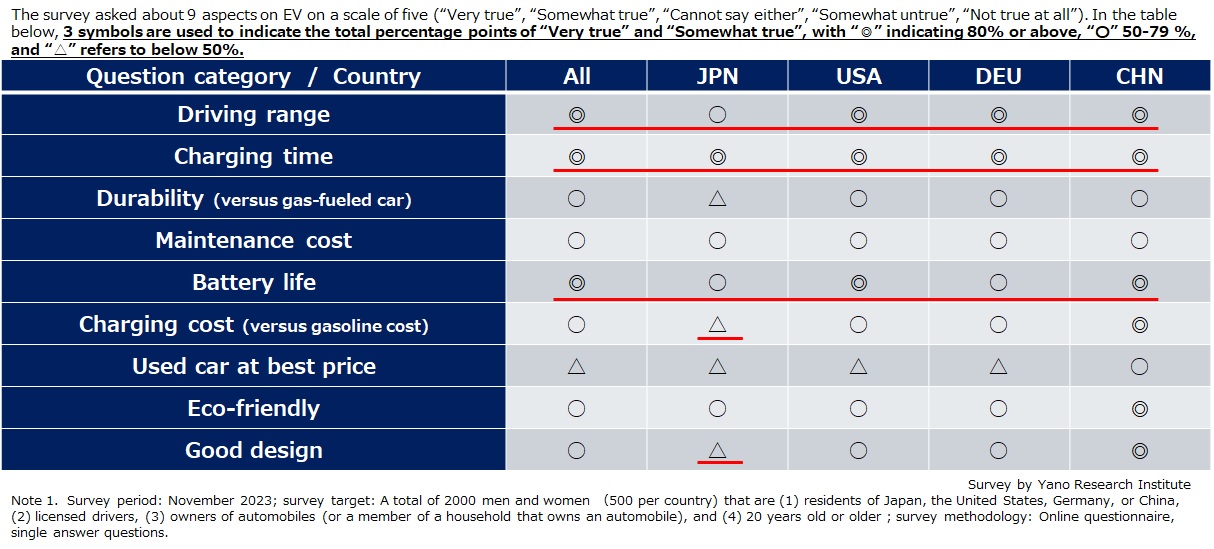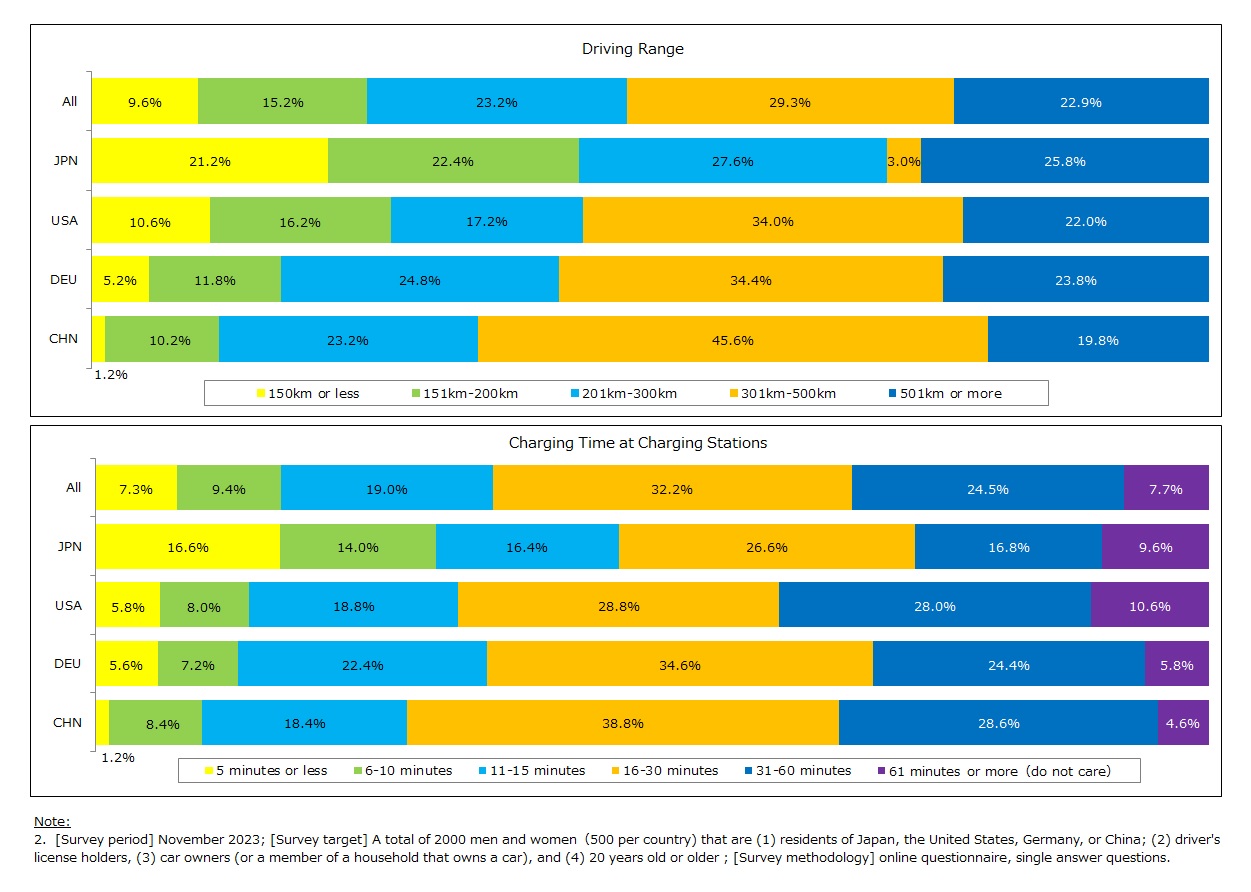No.3462
Consumer Needs Survey in Japan, US, Germany, and China on Electric Vehicle (EV): Key Research Findings 2023
According to Consumer Needs Survey Carried Out in Japan, US, Germany, and China, Top Concerns on EVs are “Driving Range”, “Charging Time”, and “Battery Life”
Yano Research Institute (the President, Takashi Mizukoshi) carried out a consumer needs survey on electric vehicles (EVs) in Japan, the United States, Germany, and China. Based on the questionnaire, we identified the consumer needs in each country, and made comparative analyses of the consumer tendency.
This press release denotes the findings on how consumers in each country view EVs, as well as their demands for EV driving range and charging time.


Summary of Research Findings
The survey asked a total of 2000 men and women (500 per country) that are (1) residents of Japan, the United States, Germany, or China, (2) driver's license holders, (3) car owners (or is a member of a household that owns a car), and (4) 20 years old or older.
To find out what consumers think of EVs and what they are concerned about when purchasing EVs, the survey asked about their concerns and preferences on 9 items, including driving range, charging time, maintenance, and design, on a scale of five (“Very true”, “Somewhat true”, “Can not say either”, “Somewhat untrue”, “Not true at all”). In the table, 3 symbols are used to indicate the total percentage points of “Very true” and “Somewhat true”, with “◎” indicating 80% or above, “〇” 50-79 %, and “△” refers to below 50%.
More than 80 percent of all respondents across 4 countries showed high interest in the following 3 aspects.
The first one was the "driving range". A total of 55.3% said they are strongly concerned about how far EV can drive on one charge, followed by 29.8% that said they are somewhat concerned. In view of the result by country, more than 80 percent of the respondents in target countries except for Japan were concerned about the driving range (Japan 77.4%, US 86.4%, Germany 81.0%, China 95.4%).
The second aspect was the "charging time". More than 80% of all respondents said they are concerned. In particular, the ratio surpassed 90% in China, with 68.4% strongly concerned and 28.8% somewhat concerned.
Thirdly, out of all respondents across four countries, 80.1% said they are more or less concerned about “battery degradation (battery life)”, with 46.2% said they are strongly concerned and 33.9% said somewhat concerned. By country, respondents that are either strongly concerned or somewhat concerned totaled to more 90% in China, indicating that consumers in China were very much interested in battery life, as well as driving range and charging time.
Additionally, more than 80% of the respondents in China said they believe “electricity costs seem cheaper than gasoline costs”, “EVs seem good for the environment”, and “the design of EV looks good”. The questionnaire revealed that consumers in China have more favorable impression of EVs than consumers in Japan, the US, and Germany.
Noteworthy Topics
Consumer Demand on Driving Range and Charging Time
In the needs survey, respondents are asked about their demands for driving range and charging time in detail. They were asked to presume that ‘driving range’ indicates the driving distance covered by a single charging, and ‘charging time’ refers to the length of time to charge at EV charging stations (i.e., not home charging).
For driving range, “301km-500km” was highest among all respondents across four countries at 29.3%, indicating their demand for EV driving range is equivalent to gas-powered vehicles. 23.2% chose “201km-300km”, and 22.9% chose “501km or more”. Meanwhile, consumers that said the driving range is okay to be “200km or less” was fewer at 24.8%.
Comparing the results by country, 65.4% of respondents in China expected EV to drive “301km or more” per charge, with 45.6% wanting “301km-500km”. In the US and Germany, the highest response was “301km-500km”, at 34.0% and 34.4%, respectively. On the contrary, respondents in Japan that chose “200km or less” was higher compared to consumers in the other three countries, with 21.2% choosing “less than 150km” and 22.4% choosing “151km-200km”. From these results, it is speculated that consumers in Japan presumes the use of EV for city driving or as a ‘second car’ (an additional car to a main car).
To the question asking their expectations for charging time at EV charging stations, as a total of all four countries, “16 to 30 minutes” was the highest at 32.2%, followed by “31 to 60 minutes” at 24.5% and “11 to 15 minutes” at 19.0%. On the other hand, “within 5 minutes” and “6 to 10 minutes” was low, altogether at 16.7%.
Japan was the only country that exceeded 30% for 10 minutes or less, with “within 5 minutes” at 16.6% and “6 to 10 minutes” at 14.0%. Compared to other countries, needs for quick charging at charging stations was higher than in other countries.
Research Outline
2.Research Object: A total of 2000 men and women that are (1) residents of Japan, the United States, Germany, or China, (2) driver's license holders, (3) car owners (or a member of a household that owns a car, and (4) 20 years old or older.
3.Research Methogology: Online questionnaire
About the Consumer Needs Survey in Japan, US, Germany, and China on Electric Vehicle (EV)
The survey on EVs, whose market is rapidly expanding worldwide, were targeted to a total of 2000 men and women that are (1) residents of Japan, the United States, Germany, or China, (2) driver's license holders, (3) owners of an automobile (or a member of a household that owns automobile), and (4) 20 years old or older. Based on the survey results, we identified the consumer needs on electric vehicles (EVs) in each country and made comparative analyses on the consumer tendency.
EVs in this questionnaire indicate passenger vehicles that use battery pack to power the electric motor. It does not include plug-in hybrid electric vehicles (PHEVs) that can be powered by electricity generated by on-board engine. By visually presenting the difference (between the types of vehicle drive systems) prior to the start of the questionnaire, we clarified to the respondents that EVs here do not refer to HVs (hybrid vehicles) or PHEVs (plug-in hybrid vehicles).
<Products and Services in the Market>
Consumer needs on electric vehicles (EV)
Published Report
Contact Us
The copyright and all other rights pertaining to this report belong to Yano Research Institute.
Please contact our PR team when quoting the report contents for the purpose other than media coverage.
Depending on the purpose of using our report, we may ask you to present your sentences for confirmation beforehand.